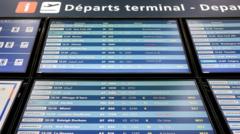As Air Canada faces a significant grounding of flights due to a strike by flight attendants, a series of developments are capturing attention both within Canada and beyond. The union representing the attendants declared a strike that began shortly after midnight on Saturday, following failed contract negotiations and a 72-hour strike notice. Their grievances, primarily focused on wages and unpaid work, led to an immediate response from Air Canada, which started delaying and cancelling flights. Initial predictions indicated that up to 500 flights would be scrapped, disrupting travel for approximately 100,000 passengers.
Air Canada has suspended all operation on its main flight services, including Air Canada Rouge, while Air Canada Express flights remain unaffected. Notably, the airline underscores the complexity of its operations, suggesting that a sudden halt poses significant logistical challenges. In an unusual twist, Canadian government officials have stepped in to enforce binding arbitration in an effort to alleviate the growing disruption.
The Canadian Union of Public Employees (CUPE), representing around 10,000 flight attendants, had been engaged in contract negotiations with Air Canada for over eight months prior to the strike. While the airline claims it offered competitive compensation—a proposed 38% increase over four years—the union contends that this offer falls short of addressing inflation and market realities, leading to claims of unpaid hours for essential duties.
As the situation escalated, the Canadian government decided to intervene. On Saturday, Jobs Minister Patty Hajdu mandated both Air Canada and CUPE into binding arbitration, a move intended to expedite conflict resolution and stabilize operational conditions. CUPE, however, criticized the government's action, arguing that it infringes on their rights and postpones the resolution of unresolved issues instead of facilitating meaningful dialogue.
Reflecting on historical context, the last strike involving Air Canada flight attendants dates back to 1985. The impact of potential extended disruptions raises significant concerns reminiscent of previous strike actions, like the 1998 pilots' strike, which halted over 600 flights. The central question remains about how long the strike will persist, with no solid timeline currently available.
For travelers affected by cancellations, Air Canada has committed to full refunds for disrupted flights and advises against arriving at airports without alternative arrangements. The airline has also coordinated with other carriers for travel alternatives. As this situation unfolds, the ongoing discussions about workers' rights, corporate responsibility, and governmental intervention remain at the forefront of this evolving narrative in Canadian labor relations.






















